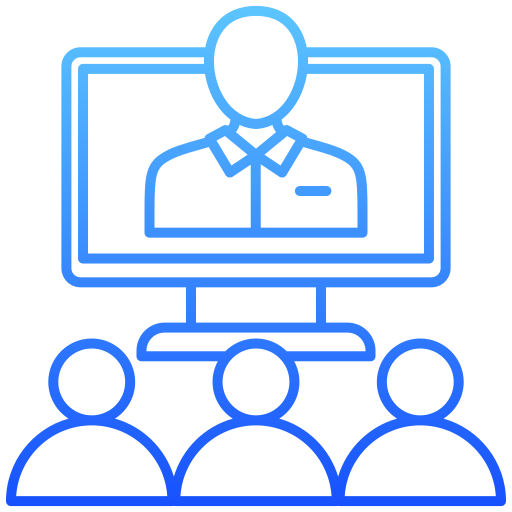Before we dive into the heart of the topic, it is important to distinguish between traditional B2B panels and the B2B digital recruitment process.
A B2B panel is a pre-recruited group of business professionals or decision-makers who have agreed to participate in market research studies over an extended period. These individuals are selected based on their roles, industries, and expertise, providing valuable insights into B2B markets. Researchers use panels to gather opinions and data on various topics related to business practices, products, services, and industry trends.
In the market research world, often B2B respondents are actually derived from B2C panels where someone is being asked for the position or company they work in – unfortunately that often lacks a proper verification method.
On the other hand, a B2B digital recruitment process offers a fully tailored approach, customizing recruitment efforts to target specific audiences. At Sample Solutions, we leverage five digital channels—SMS, email, LinkedIn, WhatsApp, and phone calls—combined with a sample drawn directly from our global B2B database covering over 700M contact person and updated close to real time. This allows us to recruit and engage business professionals and decision-makers with precision, ensuring a flexible, up-to-date, and highly targeted respondent pool for each research study.
Now that we have clarified the difference between traditional B2B panels and digital recruitment, let’s explore the key advantages of digitally recruiting B2B respondents for qualitative studies.
Access to Niche Audiences
One of the key advantages of digital recruitment is its ability to precisely access niche audiences. By harnessing various online data sources and professional networks such as LinkedIn, researchers can effectively reach highly specialized segments and hard-to-find participants. Digital channels enable targeting based on detailed criteria, including industry, job role, and expertise, allowing for a highly customized recruitment approach. For example, if a company seeks insights on emerging trends in blockchain technology, digital recruitment can pinpoint blockchain experts and decision-makers directly through LinkedIn. By filtering based on specific job titles, industry sectors, and skill sets, researchers can connect with individuals who possess the exact knowledge needed.
In contrast, traditional B2B panels may face limitations in targeting specialized or less common market segments. These panels often include a more generalized respondent pool, making it challenging to find participants with deep, niche expertise. As a result, traditional methods may lack the granularity and specificity offered by digital recruitment, potentially leading to less relevant insights and a broader, less focused dataset.
Higher Participation Rates
One of the notable benefits of digital recruitment is its ability to achieve higher participation rates. Digital outreach allows for the use of personalized messaging and targeted strategies, which significantly enhance the likelihood of securing responses from participants. By tailoring communication to address specific interests and needs, digital recruitment can effectively capture the attention and engagement of potential respondents. For instance, if a company is conducting a study on advancements in cybersecurity, personalized emails or LinkedIn messages highlighting the relevance of the study to cybersecurity professionals can lead to higher engagement rates. By focusing on the individual’s expertise and demonstrating how their input will contribute to the research, digital strategies increase the chances of a positive response.
In contrast, traditional B2B panels may face challenges related to respondent fatigue. This occurs when participants are repeatedly approached for research studies, leading to decreased motivation and engagement over time. For example, a panel that frequently surveys the same group of business executives might find that these individuals are less responsive to subsequent invitations due to a sense of over-participation or disinterest. This fatigue can result in lower response rates and a decline in the quality of data collected, as participants may become less attentive or provide less thoughtful responses. Digital recruitment, with its fresh and personalized approach, mitigates this issue by continuously engaging new and relevant respondents, maintaining high levels of participation and data quality.
Scalability
Digital recruitment provides exceptional scalability, allowing researchers to adjust the scope of their studies based on evolving project needs. This flexibility means that whether you need to quickly scale up to accommodate a large number of respondents or scale down for a more focused study, digital channels can adapt to these requirements with ease. For example, if a company is launching a global market entry strategy and requires insights from various regions simultaneously, digital recruitment can swiftly adjust to accommodate large volumes of respondents from multiple countries. Researchers can utilize digital tools to expand their reach, quickly recruit additional participants, or adjust their approach based on preliminary findings. Conversely, if a study shifts focus and requires fewer participants, digital recruitment methods can efficiently scale down without significant disruptions.
In contrast, traditional B2B panels often face limitations when it comes to scalability. These panels are typically more static, with pre-defined respondent pools that may not easily accommodate rapid changes in study size or scope. For instance, a traditional panel with a fixed number of business professionals might struggle to provide additional respondents if the study’s requirements suddenly increase, or it might be challenging to narrow down the respondent pool if a more specific focus is needed. This static nature can constrain the flexibility needed to manage dynamic and large-scale studies effectively.
Global Reach
Digital recruitment excels in offering a global reach, overcoming geographical barriers that might affect traditional B2B panels, which are often limited to specific countries or regions. Digital platforms enable researchers to connect with respondents from around the world, tapping into a diverse pool of international participants effortlessly. For example, if a multinational corporation is researching consumer behavior across different continents, digital recruitment allows them to access and engage with respondents from various countries, providing a comprehensive and global perspective.
Traditional B2B panels, on the other hand, might be restricted to specific geographic areas due to their focus on local or regional respondent pools. For instance, a panel based in North America might have limited reach when it comes to gathering insights from Asian markets or European regions. This geographic limitation can result in a narrower view of global trends and challenges, affecting the overall relevance and applicability of the research findings. Digital recruitment bypasses these limitations by utilizing online platforms and networks that facilitate global outreach, ensuring that researchers can gather diverse and representative data from a wide array of geographic locations.
Data Accuracy and Freshness
One of the significant advantages of digital recruitment is the ability to ensure data accuracy and freshness through real-time verification of respondent information. Digital recruitment methods enable researchers to continuously update and verify participant details as part of the recruitment process. For instance, when engaging potential respondents through digital channels like LinkedIn or email, researchers can immediately check and confirm their current job roles, contact information, and relevant qualifications. This real-time validation ensures that the data collected is both accurate and up-to-date, enhancing the reliability of the research findings.
All invitations go via a verified business email address only – this ensures that the person is actually working at the company he is claiming to work at.
In contrast, traditional B2B panels may rely on pre-existing databases that can become outdated over time. For example, a panel might include business professionals whose often coming from a B2C panel where anyone is coming from a Fortune 500 company and working as a CEO. This reliance on outdated information can lead to challenges in verifying the accuracy of participant details, potentially impacting the validity of the research. Participants might have moved to different roles or companies, and their current relevance to the study may no longer be accurate. As a result, the data collected from such panels may be less reliable and not fully reflective of the current market conditions.
More Data Points
Another advantage is the fact the the data is provided by different websources like the actual company website, job recruitment boards, professional social media sources or news outlets. Linking this kind of data can allow information what kind of technology has been employed, how long a person has been working, what are the skills sets and so on.
Pricing
Pricing wise: more expensive, real incentives (minumum of 50 Euro but often 100 Euro plus). No 20 Euro B2B interviews.
Conclusion
In summary, digital recruitment offers a range of advantages over traditional B2B panels, making it a powerful tool for qualitative studies. By providing precise access to niche audiences, achieving higher participation rates, and offering scalable and global reach, digital recruitment enhances the efficiency and effectiveness of gathering insights. Moreover, the ability to verify data in real time ensures that the information collected is both accurate and relevant. As businesses increasingly seek detailed and timely insights, the benefits of digital recruitment make it a preferred choice for researchers aiming to capture the most current and precise data from targeted B2B respondents.
At Sample Solutions we do not believe that B2B respondents should be added to a panel and manually update their data. Often they participate because of an interesting topic next to the incentive amount. Therefore it is essential that we as data collection agency take away the pain of them having to update data manually since we can leverage all the different aspects of Big data to pinpoint the right decision maker even when someone changes from one company to another.





